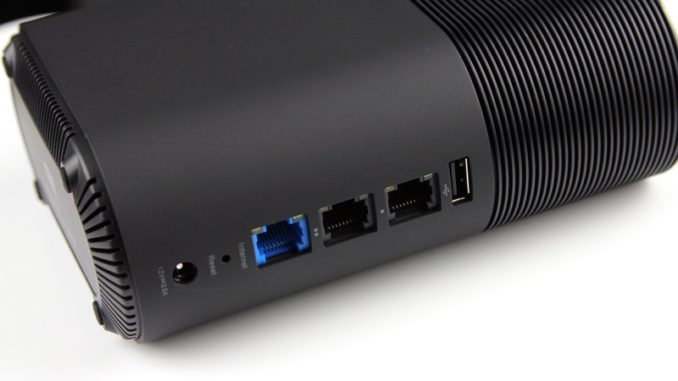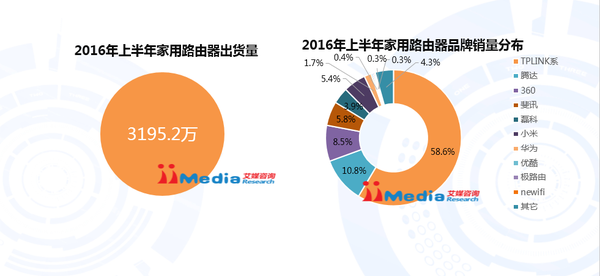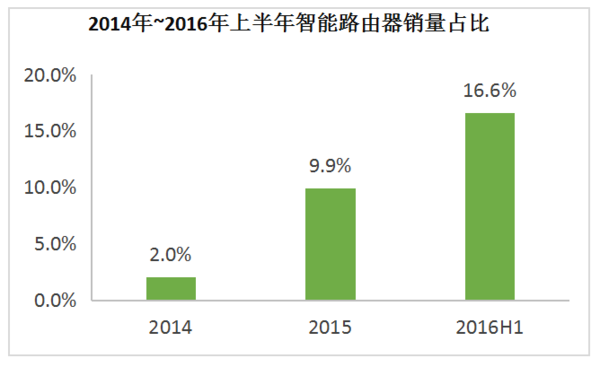
With the continuous expansion of the smartphone market, smart routers have become another new field for business development. At present, the market share of online routers is far ahead of the offline market. It has formed a confrontational situation. In the future, the offline channels of intelligent routers will become the main router manufacturers. The point of force. The “China Smart Router Market Monitoring Report for the First Half of 2016” released by iiMedia Research is aimed at the interpretation of the current situation of the Chinese router market, user behavior analysis and future trend forecasting.
The proportion of intelligent routers is growing, and the market size is considered in the future.

According to iiMedia Research data, in the first half of 2016, the total shipment of China’s home routers exceeded 30 million. In terms of market sales, TP-LINK is still far ahead, and 360 leads the sales of intelligent routers, accounting for 8.5%. The share is slightly lower than Tengda, ranking third. Other intelligent routing vendors have also accounted for half of the home route TOP10, indicating that smart routers are expanding market share. In terms of configuration, the sales of routers supporting 802.11AC and above have increased significantly, and the WiFi in 5G bands has become more popular. The unit price of home routers has increased, reflecting the increasing demand for high-configuration routers.

2014-2016 years sales ratio of smart routers
Although the shipments of home routers were basically the same as last year, there was no significant increase, but the market share of smart routers showed a significant growth trend, and the sales ratio was gradually increasing. According to data from iiMedia Research, smart router sales accounted for 16.6% of the total sales volume of the home router market in the first half of 2016, which is a significant increase from the 9.9% in 2015 and 2.0% in 2014.
The online channel is in a confrontational situation, and the offline channel will become a new force point.
At present, China’s intelligent router industry has re-shuffled. iiMedia Research (Ai Media Consulting) data shows that in the first half of 2016, 360 router sales led the Chinese intelligent router market, accounting for 51.5%, ranking first, Xiaomi, Huawei ranked Two or three, each accounting for 32.2% and 10.0%. In terms of sales growth rate, 360 routers led the market, compared with the same period last year, the sales growth rate reached 143%, followed by Xiaomi and Huawei. The share of other manufacturers has stopped or even regressed, showing that the smart router industry has shuffled.
In the smart router sales channel, iiMedia Research (Ai Media Consulting) data shows that in the first half of 2016, China’s intelligent router manufacturers collectively launched online, and the proportion of offline sales channel shipments rose to 40.6%. It is believed that the intelligent routing online channel has presented a confrontation with traditional manufacturers, and offline will become a new growth point. Intelligent routing is steadily preempting the traditional home routing offline channel market. On the other hand, 360 relies on cooperation with Netcore, offline. The channel provides important support for overall sales, and the overall online channel sales share has declined. Ai-Media analysts believe that the main growth point of smart hardware sales in 2016-2017 is expected to move to offline.
Improve the transmission speed of intelligent routers, improve user experience and improve the sensitivity
The propaganda point of the intelligent router is that it is convenient and concise, and can expand the content. However, for the users of the router, the most important thing is the basic function of the router. If the intelligent router wants to obtain more promotion, it must be able to solve the traditional The pain point is small in routing range and slow in transmission. In terms of the advantages of intelligent routers, iiMedia Research (Ai Media Consulting) data shows that more than two-thirds of mobile Internet users surveyed believe that intelligent routers have high-speed transmission speed, and 53.6% of users believe that the advantage of intelligent routers lies in their expansion capabilities. The transmission signal and information security are the most concerned issues for intelligent routing users. At present, some intelligent routers have certain problems, the signal is unstable, the transmission distance is limited, and the mobile phone App is faulty, which causes user confusion. In addition, users have concerns about whether smart routers can effectively protect personal information.
Future trend forecast
The intelligent router will expand the competition in the configuration and return to the essence of the router. For router users, the most important thing is the basic performance of the router. Whether it is a traditional router or a smart router, the requirements for performance configuration are the most important. To capture the market share of traditional routers, intelligent routers must enhance the performance of basic configurations such as memory size, chip performance, and penetration capabilities.
Intelligent routing vendors compete for upgrades and strive for smart home portals. Intelligent routers are an important entry point for smart homes in the future. Intelligent router vendors represented by Internet brands have occupied a certain position in the home routing market in the past two years. From the first half of 2016, the focus gradually shifted from grabbing the hardware market to function applications. Competing with the smart home entrance form.
The online channels of the intelligent router market form a confrontation, and the offline becomes the next explosion point. Intelligent routing vendors have occupied a considerable share of online channels, entering the stage of the gradual competition with traditional vendors for the offline channel market, and are in a steady growth stage, while brands such as 360 and Xiaomi have begun to lay out offline markets where traditional vendors have absolute superior resources. In the second half of 2016, the offline channel will be the point of explosion of intelligent routing.
Original Article Source from https://www.jiaheu.com